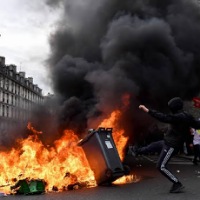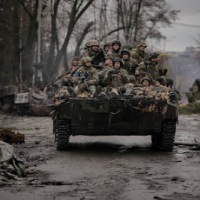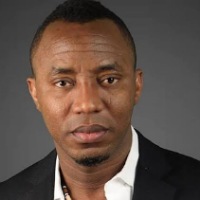International News
France Police Arrest Hundreds In Fifth Night Of Riots

The French government announced on Sunday that additional arrests had been made during a fifth consecutive night of riots triggered by the fatal shooting of a 17-year-old by the police.
As tensions escalated, law enforcement authorities dispatched extra personnel to cities across the country that had become hotspots for unrest.
The demonstrators, primarily consisting of underage individuals, have set cars on fire, caused damage to infrastructure, and engaged in confrontations with the police, expressing their deep-seated anger following the officer’s point-blank shooting of Nahel M. during an attempt to escape a traffic stop on Tuesday.
The incident, which was captured on video and widely shared on social media, has intensified public outrage over police violence targeting minority communities, revealing the significant racial tensions prevalent in France.
In the aftermath of Nahel’s funeral in his hometown near Paris, the interior ministry reported that the police had conducted 719 arrests overnight, although this number is still considered a preliminary count. It follows a previous night where approximately 1,300 arrests were made.
According to official reports, a total of 45 police officers or gendarmes sustained injuries during the unrest.
Additionally, there were 577 vehicles set ablaze, 74 buildings deliberately ignited, and 871 fires intentionally started in streets and other public areas.
Although the nationwide figures indicated a general decrease in tensions throughout the country, law enforcement authorities still documented several incidents that occurred during the period.
The mayor of a town located south of Paris reported that rioters had deliberately crashed a car into his residence, resulting in injuries to his wife and one of his children. Furthermore, the assailants set a fire at the scene.
“Last night the horror and disgrace reached a new level,” said the mayor, Vincent Jeanbrun, while prosecutors said they were investigating the incident for attempted murder.
A considerable force of 45,000 police officers was deployed throughout France, mirroring the previous night’s deployment. Additional backup was sent to the areas that had experienced riots in the preceding days, such as Lyon, Grenoble, and Marseille.
Within this total number, 7,000 officers were concentrated in Paris and its surrounding suburbs, with particular attention paid to securing the iconic tourist destination, the Champs Elysees avenue in central Paris, as there were calls on social media to bring the unrest to the heart of the capital.
The significant presence of law enforcement personnel proved instrumental in maintaining control over the situation, according to Interior Minister Gerald Darmanin.
“A calmer night thanks to the resolute action of the security forces,” he tweeted early Sunday.
In Marseille, a city that has witnessed severe clashes and looting during the recent unrest, police took action to disperse groups of youths on Saturday evening along Canebiere, the main avenue in the city center, as reported by AFP journalists.
In response to the escalating situation, several towns have declared overnight curfews to curb the violence and maintain public safety.
The ongoing protests have become a new crisis for President Emmanuel Macron, who had been striving to proceed with his second term after successfully navigating through months of protests that erupted in January, primarily concerning the proposed increase in the pensions age.
The gravity of the situation was further highlighted when President Macron made the decision to postpone his state visit to Germany, originally scheduled to begin on Sunday, in order to address the domestic issues arising from the unrest.
International News
ICC Issues Arrest Warrants For Israeli Prime Minister Netanyahu, Others
The International Criminal Court (ICC) has taken a historic step, issuing arrest warrants for Israeli Prime Minister Benjamin Netanyahu and former Defense Minister Yoav Gallant.
The charges include crimes against humanity and war crimes allegedly committed during Israel’s recent assault on Gaza.
In a detailed statement, the ICC accused the Israeli leaders of “intentionally and knowingly depriving the civilian population in Gaza of objects indispensable to their survival, including food, water, and medicine and medical supplies, as well as fuel and electricity.”
READ MORE: Osun Govt Decries Attempted Murder Of Park Mgt Chairman By Police
The ICC’s move marks a significant escalation in international scrutiny of the Israeli-Palestinian conflict. Netanyahu and Gallant are alleged to have orchestrated policies that caused severe harm to the civilian population in Gaza, leading to widespread condemnation from human rights organizations.
Alongside the charges against Israeli officials, the ICC also issued an arrest warrant for Hamas military commander Mohammed Deif. Deif has long been a central figure in Hamas’s military operations. Israel’s military claims to have killed him in a July airstrike, although this has not been independently verified.
The warrants highlight growing calls for accountability amid the ongoing conflict in the region. The ICC’s actions are likely to provoke heated debate and may complicate diplomatic efforts aimed at resolving the crisis.
With the warrants issued, global attention now turns to how the international community will respond and whether any practical steps will be taken to enforce them.
International News
COP29: Climate Summit Faces Deadlock Over Vague Funding Proposals For Vulnerable Nations
As the 29th United Nations Climate Change Summit (COP29) nears its conclusion, tensions are rising over a newly published funding proposal aimed at assisting developing nations in addressing climate-induced crises.
The proposal, released by the United Nations Framework Convention on Climate Change (UNFCCC) on Thursday, has sparked widespread debate among delegations, activists, and observers at the summit.
The document, spanning ten pages, outlines funding options to support developing countries in implementing their Nationally Determined Contributions (NDCs) under the 2015 Paris Agreement.
READ ALSO: Osun Explains N75,000 New Minimum Wage
However, it fails to specify how much wealthier nations are required to contribute annually—a key sticking point that has drawn criticism from the Global South and climate advocates.
Ambiguity in Funding Commitments
Critics argue that the absence of concrete figures undermines the credibility of the proposed framework.
Mohamed Adow, Founder and Director of Power Shift Africa, described the proposal as “a blank piece of paper,” highlighting the lack of clarity on financial commitments.
“This is the ‘finance COP.’ We came here to talk about money. The way you measure money is with numbers. We need a cheque, but all we have right now is a blank piece of paper,” Adow remarked during an interview.
The Global South, led by African delegations, is demanding at least $1.3 trillion annually by the end of the decade to adapt to climate change impacts and transition to sustainable energy systems.
Yet, developed nations have yet to commit to a specific annual figure, raising concerns over the summit’s ability to deliver tangible outcomes.
Key Provisions and Concerns
The new text acknowledges the disproportionate impact of climate change on developing nations and the financial barriers they face, including high costs of capital and limited fiscal space.
READ ALSO: NNPCL Launches Utapate Crude Oil Blend, Eyes Production Expansion In 2025
It proposes the establishment of a New Collective Quantified Goal (NCQG) for climate finance, suggesting a framework of “at least USD [X] trillion annually” from 2025 to 2035.
However, the absence of defined numbers has led to frustration among negotiators.
David Tong, Global Industry Campaign Manager at Oil Change International, emphasized the critical role of finance in achieving meaningful progress.
“Without finance, there is no phase-out [of fossil fuels], no energy transition, no adaptation. The ambitious options are simply missing,” Tong stated during a press briefing.
Rising Frustration from the Global South
Delegates from the Global South have expressed dissatisfaction with what they perceive as weak commitments from developed nations.
Many fear that without concrete financial pledges, the summit’s outcomes may fall short of expectations.
“This summit is about delivering justice to those who suffer most from climate impacts. Wealthy nations must step up and provide the necessary funding,” said an African negotiator, speaking on condition of anonymity.
A Critical Juncture
With less than 48 hours remaining in the summit, the stakes are high. The COP29 negotiations in Baku, dubbed the “finance COP,” are expected to set a precedent for addressing the financial needs of vulnerable nations.
Delegates are calling on world leaders to finalize an ambitious NCQG target and bridge the growing divide between developed and developing nations.
International News
Biden Approves Anti-Personnel Mines For Ukraine
In a significant policy move, U.S. President Joe Biden has authorised the transfer of anti-personnel mines to Ukraine, signaling heightened support for the country amid its ongoing struggle against Russian forces.
The decision underscores the administration’s commitment to bolstering Ukraine’s defensive capabilities as the conflict shows no signs of abating.
This announcement follows reports that Ukrainian forces have employed U.S.-supplied ATACMS missiles to conduct precision strikes within Russian territory.
These developments have reportedly prompted Russian President Vladimir Putin to modify elements of Russia’s nuclear doctrine, further intensifying global scrutiny of the conflict’s escalation.
READ MORE: Vinicius Jr. Honors Cameroonian Roots Ahead Of Brazil’s Clash With Uruguay
In addition to the mines, the U.S. is set to unveil a new $275 million military aid package for Ukraine in the coming days. The package is expected to include a range of munitions and equipment aimed at enhancing Ukraine’s operational readiness.
This move aligns with Washington’s broader strategy to maintain robust support for Kyiv, even as questions loom over potential shifts in U.S. foreign policy with the approaching transition to a new administration.
The U.S. government has remained steadfast in its support for Ukraine, with officials emphasizing that these measures are essential for helping Ukraine defend its sovereignty. The provision of anti-personnel mines, however, marks a controversial step, reflecting the urgency of the situation on the ground.
As the conflict continues, the Biden administration’s decisions will likely have profound implications not only for Ukraine but also for the broader geopolitical landscape, where tensions remain high and outcomes uncertain.
























